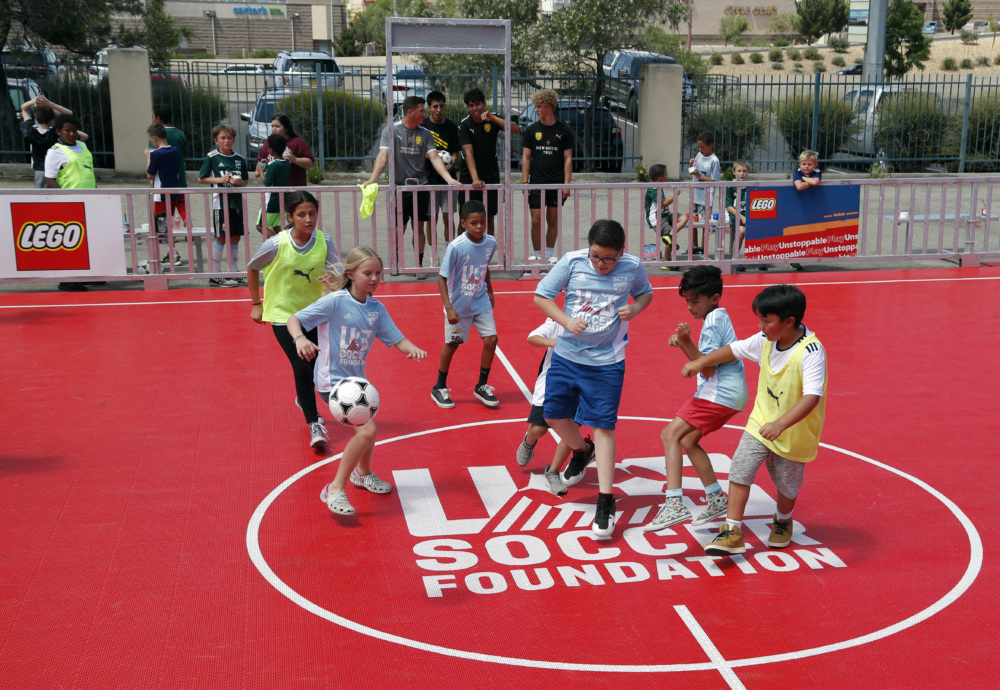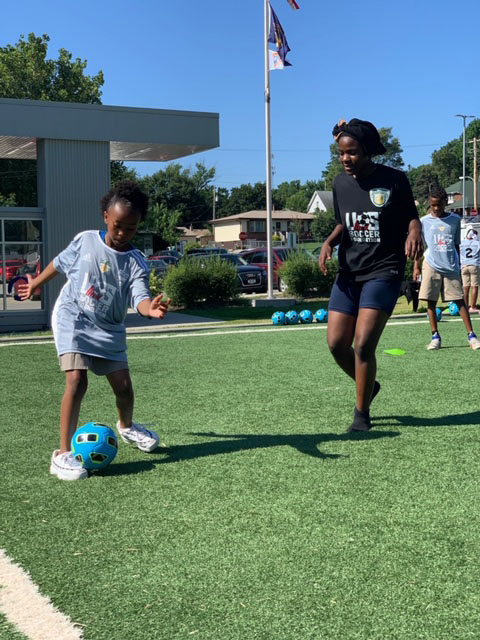

Let soccer do what soccer does.
Together, we can give millions of kids from underserved communities safe places to grow, thrive and build confidence for life.
A Solution at The Simple Foundation
When The Simple Foundation started offering soccer programming at their center in Omaha, Nebraska, the teams were made up predominantly of boys.
In fact, so few girls were rostered that The Simple Foundation didn’t have any girls teams. Of the girls who did come to play, most stopped showing up because they wanted to play with other female peers.
Having played soccer at The Simple Foundation herself and now a full-time professional running the Soccer for Success program at the Foundation, Afiya Madut is on a mission to get more girls involved in soccer because she believes that soccer is for everyone. “Back then, there weren’t any girls teams,” Afiya says of her time as a youth player. “It was just me and my two sisters training with the boys, and we got tired of training with the boys.” With Afiya at the helm, the Simple Foundation set out to figure out why girls weren’t joining teams and what they could do to change that.
What they knew was that the community they serve is made up of individuals from diverse backgrounds, but mostly of immigrant communities, including from Sudan and Ethiopia and of various tribes such as Uduk, Mabaan, and Bantu. Customarily, it is the duty of women in the family to help around the house, help with meals, and take care of siblings. In addition, parents told the program leaders that they also worry about their daughters getting injured on their way to practice or on the field and that they worried that by playing soccer they wouldn’t be able to protect their customs in terms of style of dress.
So, they got to work going directly to the families with girls themselves to recruit. In some cases, this included knocking door to door to let the communities know about upcoming tryouts or sending kids home with flyers. Afiya and her colleagues also help put on pop-up events where families play soccer and enjoy food from the grill.

But in a community whose native language is not English, The Simple Foundation also went a step further to help alleviate any worries. Makay Weliyo is a family liaison who speaks Maay Maay and Somali (she mentions she’s still working on her Spanish), which allows her to call parents and help address their concerns. “I help them understand that it is OK for girls to come out and play soccer. It is OK for them to come and express themselves,” she says. “A lot of parents feel that girls won’t be able to protect themselves if someone tries to hurt them, so then we just go over each and every person who works here, each and every person who is a coach, that they have to go through training, they get a background check, and that all the kids know if anything happens to go directly to somebody.”
The Simple Foundation also provides long pants and hijabs for girls to wear while playing, which makes the parents more comfortable as well. According to Afiya, this helps parents realize “they actually care about our kids” and “that made it easier for the parents to let their daughters come.”
Now, there are about 80-100 girls participating in soccer at The Simple Foundation. And for many of them, soccer has only just opened their eyes to what they are capable of. “Soccer gave them a lot of freedom,” says Afiya. “We went out and saw new things, learned new things every single soccer practice. We learned ‘I may be a girl, but I can still do all the stuff the guys are doing, or even more.’”

“One of the biggest misconceptions that I had when I started playing soccer would be that I would never be good as the boys,” she continues. “That has changed by seeing all these amazing female players who play their hearts out every game.”
This sentiment is also especially true for Afiya’s sister, Biyana, who played soccer and is now pursuing her real estate license. “For me, soccer helped me a lot with playing high school soccer. I was able to make varsity my freshman year,” she says. “Being a part of the program, you have a lot of opportunities.”
Biyana remarks that parents’ attitudes have changed too. “Now they know where we are, what we’re doing, and we’re grown now so they expect us to make our own choices that are good for us.”
And lastly, it’s not only the girls and their parents whose perceptions have changed. Makay remembers seeing brothers watching their sisters play for the first time. “It is amazing,” she says. “They get so excited, saying things like ‘Oh, I didn’t know my sister could kick that great!’ It’s just very nice when they’re supporting each other.”
The Simple Foundation is one of the U.S. Soccer Foundation’s United for Girls cohort partners. Launched in June 2019, United for Girls is an initiative aimed at increasing opportunities for young girls and women from underserved communities to play soccer and reap its many benefits. Through this effort, The Simple Foundation is learning how to identify, elevate, and scale best practices for recruiting and engaging women coach-mentors and players in U.S. Soccer Foundation programs.
